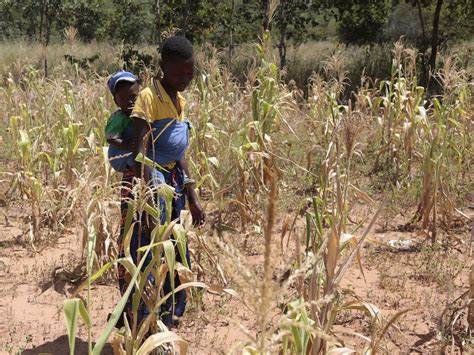HARARE – The government has expressed concern over how women, the elderly and children from Mwenezi district are left to carry the hunger burden as most active men are relocating to South Africa in search of greener pastures.
Isaac Mutambara Mwenezi District Development Coordinator said because of the district’s proximity to South Africa, men continue to leave and in some cases never return while families continue the struggle to survive without their bread winner.
He was speaking to journalists during a recent mission to witness various drought mitigation projects being implemented by the World Food Programme (WFP) and its partners working hand in hand with the government.
“For our people, we are saying, the most vulnerable groups are women, the old age and the school going children because of our proximity to South Africa.
“We are only 80km from South Africa and the energetic young guys who still want to look for greener pastures legally or illegally…they prefer to go to South Africa.
“Surprisingly, when they get there, we find it entirely unhelpful because they usually forget the old people they left this side.
“The old, the young and the women are left to fend on their own and these are the old people without energy, ideas and the necessary resources,” he said.
Mutambara also raised issues of exploitation stating that people from as far as Harare rip off farmers through buying their traditional grain at very low prices.
He said 143,000 people from the district are receiving food aid, with 97,000 being catered for by WFP through its partner, Mwenezi District Training Centre.
“We have received 30 boreholes that are solarised; people are going to establish nutrition gardens. Each nutrition garden benefits more than 100 people and this is a way of industrialising villages as agriculture is now considered to be a business on its own.
Mwenezi is an agricultural district surviving on a livestock population of approximately 189,000 cattle but the situation is bad due to drought.
“The deterioration is happening at an alarming rate, but the government has intervened to say there is a livestock drought mitigation programme.
“So far, we have received more than 10 boreholes for livestock because the most stressful thing for animals is the distance they travel as they want to get to the water point. So, the government is reducing the distance by establishing open boreholes for livestock at the same time supplementary feed.
“So far, we have more than 500 of our farmers who have received silage for the drought mitigation programme.
“So, these are the interventions that we want to cross the season so that people normalise their lives regardless of the harshest season ever recorded in the history of Zimbabwe,” he said.
President Emmerson Mnangagwa earlier this year declared hunger a national disaster.
To this end, all government partners, CSOs and the business community have joined hands to ensure no one starves.
WFP and its partners have implemented drought resilience programmes which have changed the hunger situation in a great way.
WFP distributed food to three districts including Mwenezi, Buhera and Mangwe following Africa Risk Capacity (ARC) insurance payout of US$6,1 million in support of government’s Food Deficit Mitigation strategy.
Beneficiaries received food to last them for the next two months with an individual getting 17kg of grain, 3,4kg of pulses and 1,2 litres of cooking oil.
Through the ARC programme, WFP purchases climate insurance on behalf of the government, enabling rapid access to funds when droughts occur based on rainfall deficits.
This funding allows for early interventions such as food distribution and cash transfers to protect vulnerable populations.
Another initiative is the Zambuko Livelihoods Initiative (Zambuko) which promotes an integrated approach to resilience building through improving smallholder farmers’ production, management of community resources and access to finance and markets to decrease vulnerabilities to recurrent crisis.
Communities have also been empowered with nutrition gardens with support from the USAID.
















